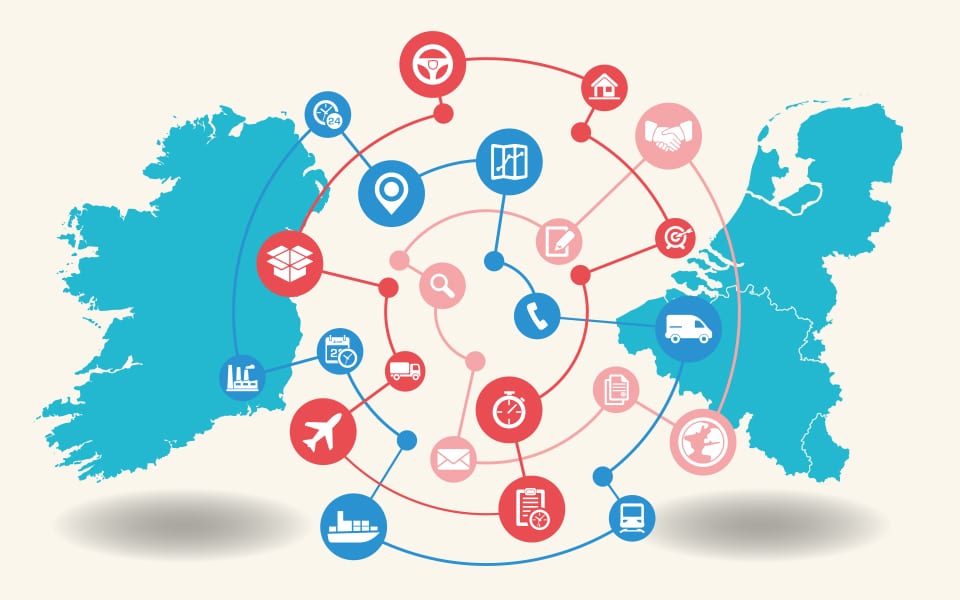There are challenges to breaking into new export markets like Benelux. These include determining if your products are the right fit for your target market, cultural and linguistic barriers, and the costs of establishing a presence in a new country.
While support from resources like Enterprise Ireland’s overseas offices and Market Research Centre will help you to find solutions for these challenges, sourcing indigenous partners for sales channels is one way that Irish companies gain footholds in new regions.
As an exporting nation, Ireland’s track record in building bridges to new markets is strong. Right now, one of the most exciting market opportunities lies in the nearby Eurozone. As well as offering attractive markets individually, the Benelux region, covering the open economies Belgium, Luxembourg and the Netherlands, offers a valuable proving ground for, and gateway to, that wider Eurozone market.
Why you should consider sourcing an export partner for Benelux
Choosing the right export partner is a significant undertaking. Care must be taken to ensure that the partnership will be adequately beneficial. When done well, it will give your business a solid foundation in the new market.
The potential benefits and risks were expertly outlined by QuPact’s Brian English at Enterprise Ireland’s Ambition Benelux event in Athlone. English advised that the usual route to market channels for Benelux are similar to those that work in Ireland, and include partners, distributors and wholesalers, agents and reps, direct sales, franchising, and licensing to referral partners.
Initially, bypassing your own direct salesforce to get up and running can offer advantages, English told attendees: “I encourage people to think about using channels for two big reasons. First, is the time to get your product to market. If you compare the amount of time that you can get to sales, invoicing and collecting money in a market using channels, compared to setting up and going directly or acquiring customers directly, that is a big win.”
 “Secondly, there is a saving on direct costs. Think about the cashflow impact that putting a direct salesperson into the Benelux region has from day one: payroll costs, expenses, and associated costs.
“Secondly, there is a saving on direct costs. Think about the cashflow impact that putting a direct salesperson into the Benelux region has from day one: payroll costs, expenses, and associated costs.
“Whereas, if you can leverage the right channel, it’s quite feasible that you can source a partner who owns the relationship with your target customer. That can help you to get to sales quicker, and with more conserved cash.”
While Enterprise Ireland’s in-country market advisors are always available to assist with networking with potential partners, English advised that options are also often found within the company’s existing network.
Get inspired by Azpiral and Over-C’s successful partnerships in Benelux
The conference heard that Limerick’s Azpiral, creators of the AzpiralPRO integrated real-time loyalty platform, had just concluded a deal that will see their cloud-based solution positioned in 350 AVIA service stations in the Netherlands, representing 10% of the market. AVIA is an international leader in the European forecourt sector, with over 3,000 stations across 15 European countries.
After exploring opportunities in the market last year, Sales Director Kevin Nolan reported that he is “hopeful that being the first choice in loyalty software for international brands like Circle K, Gulf Oil, Spar and AVIA will present opportunities for Azpiral to continue to expand internationally.”
A second success story is Cork’s Over-C, who deploys an integrated digital platform providing transparency for all functions relating to the upkeep of high-footfall, high-risk public facilities, such as shopping centres, stadia and transit hubs, with operations in Amsterdam.
Over-C leveraged existing links with Dutch-owned client ScotRail when targeting the market. James Murphy, Head of Partnerships, told delegates: “I see the Netherlands as a gateway to the rest of Europe. The Netherlands are early software adopters, and Germany looks at the Netherlands and what works there, so it’s good preparation for new markets.”
Over-C’s innovative software uses artificial intelligence, data and analytics to provide industry professionals with key insights for time-critical decision-making. It has been operating in the Dutch market for two years, with customers including Facilicom, Trigion, Koopgoot, Plaza Nieuwegein Shopping Centre, and Wereldhave. Over-C is currently working with KPN to identify further opportunities through their customer base.
Some firms can view channels as an afterthought, and still see direct sales as the best option, but they are missing out on leveraging a partner’s boots on the ground, English said.
“Think about putting them at the center of your business. They have an input into the sales process, into marketing, into new product development, into engineering. If you can bring the channels, as your eyes and ears in the local market, into your business and get contributions into those critical areas, you’ll end up with a much better sales ecosystem.”
Vetting your prospective partners, be they agents or distributors, is vital, said English. Make sure you understand the laws and compensation due to an agent should you eventually terminate the arrangement as it covers not only existing customers but those you may subsequently acquire based on agent work.
Distributors of your product should be vetted to ensure they have the capital or secured credit in place to acquire your stock, a frequent oversight by many, said English.
Whichever route you choose, make sure you’re partnering with someone who owns that end relationship with your target customer, he added.
“Look at all of their routes to market and find out who owns the relationships with those end customers. It’s a labour of love that takes about 30 days. But once it’s done, you can make really informed decisions about your strategy to go into the markers and about which channels you want to work with.”



